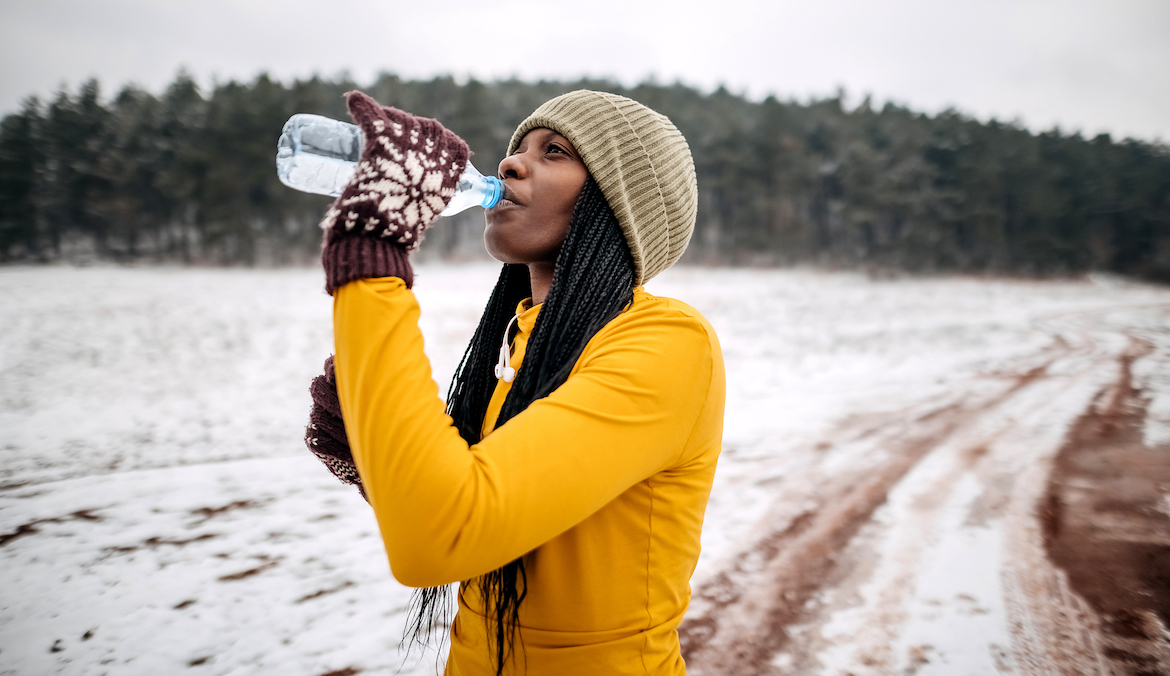If you use cold weather as an excuse to skip the handheld water bottle, you’re not alone. “A lot of people are very resistant to drinking in the cold weather,” says Claire Shorenstein, MS, RD, CDN, a sports dietitian and running coach. “They don’t want to carry the water, or they don’t want to have to pee more.”
But that’s a mistake. Dehydration isn’t solely a warm-weather phenomenon, and if you’re exercising without drinking enough water—even on the chilliest days—your workout’s gonna suffer.
Why winter hydration is key
When we think about hydration, we usually imagine replacing the water and electrolytes we lose through sweat. And while it’s true that you’re likely sweating less in cold weather than you do in the heat, you’re probably losing more water to sweat than you realize, says Dr. Brian Babka, a sports medicine specialist at Northwestern Medicine. That’s because the cold, dry air is causing your sweat to evaporate faster than it does in humidity, so it might be gone before you even notice it.
And get this: Your total water losses from working out in cold weather actually won’t be drastically different than in the summer, says Dr. Babka, since you’ll be losing water in other ways, like teary eyes, a runny nose, and your breath. “Your body wants to be able to humidify the cold, dry air,” he says. “So you’re increasing water input through your pulmonary system and you’re exhaling water.” Cold weather also makes us urinate more, he says, as part of the body’s attempt to stay warm.
No matter the temperature outside, getting dehydrated is gonna make your workout more difficult, since your body is forced to work harder, says Shorenstein. You’ll feel the effects afterwards, too: If you’re experiencing headaches, GI issues, or dark urine, take it as a sign that you probably need to be drinking more.
How much should you be drinking in cold weather?
In general, Dr. Babka recommends drinking a similar volume of fluid in cold weather as you do when it’s hot out. But if you want to get specific, Shorenstein suggests doing multiple sweat rate tests throughout the year as temperatures change, to get a sense of how much water you’re losing in various types of weather and planning your hydration from there. (The test involves weighing yourself—if you find that triggering, Shorenstein says using perceived sweat rate is okay.)
While your sweat rate will change in different temps, your sweat composition—meaning, how salty your sweat is—won’t. Whatever type of hydration you’ve found to work for you on mild days (which should include electrolytes if you’re a salty sweater or are out there for multiple hours), should work in the winter, too.
Sure, sipping on nearly-freezing water during a chilly run or bike ride doesn’t always sound fun. The good news is that your pre- and post-workout hydration (again—still essential in the winter!) can be an opportunity to warm up, says Shorenstein, whether with tea, broth, or hot chocolate.
Tips for hydrating in the cold
1. Have a plan
When we’re cold, our thirst signals are muted, says Dr. Babka. Without our body telling us when to drink, we need to be more intentional about our hydration. That might mean approximating time or mileage intervals to take a few sips, or setting reminders on your watch if you’re likely to forget. “You just need to be a little more conscious of it,” he says, “because there’s not going to be the physiological urge to do it.” Heavy sweaters especially shouldn’t wait until they feel thirsty to start hydrating, adds Shorenstein, since they’ll likely already be starting to dehydrate by then.
2. Watch your caffeine intake
Since the cold weather will already make you pee more, be careful about how much you’re drinking diuretics like caffeine to avoid having to make pit stops, says Dr. Babka.
3. Keep fluids from freezing
Try storing fluids under layers or close to your body so they don’t freeze, says Shorenstein, and add salt to water to lower the freezing point. If you use a hydration vest, you may need to invest in insulated tubing. Remember that public water fountains might be turned off for the winter, so make an alternate plan in case you need to refill. Starbucks stop, anyone?
